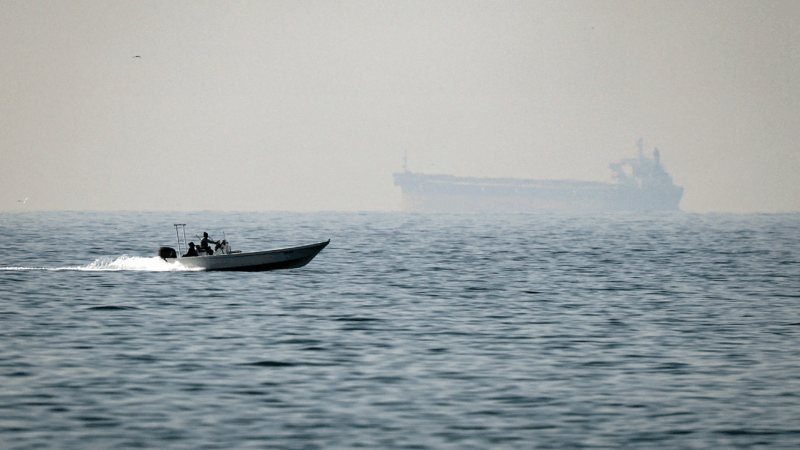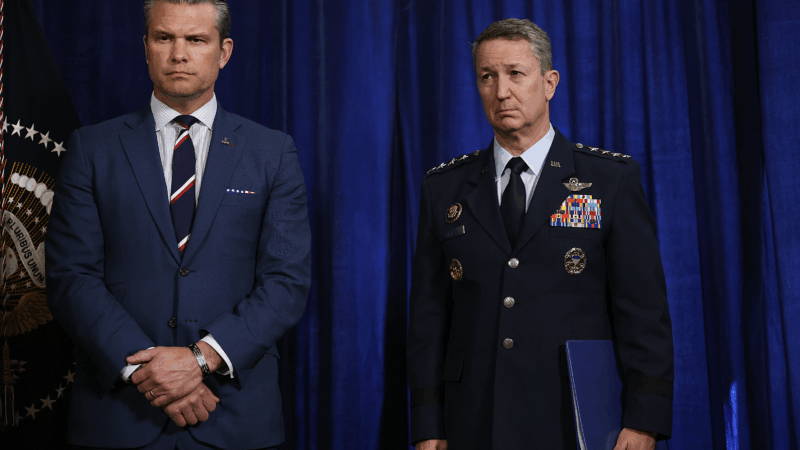Israel was once deterred from striking Iran. Now Netanyahu takes a victory lap
TEL AVIV, Israel — It is a story spanning more than 30 years of rhetoric, and 20 months of war that remade the Middle East.
For decades, Israeli Prime Minister Benjamin Netanyahu wanted to attack Iran, but the United States and his own security chiefs deterred him.
Now, after launching 12 days of strikes on Iran and agreeing to a ceasefire Tuesday, Netanyahu is claiming a “historic victory.”
How did he pull it off now — and recruit the U.S. to join in?
“All of the chess pieces have moved,” said Reuven Hazan, a political science professor at Hebrew University. “While Netanyahu’s been talking about this for decades, it is only in the last several months that this has all lined up for him and it’s become possible.”
Israel used to be deterred
Netanyahu warned about Iran’s nuclear program for more than three decades, in speech after speech.
A decade ago at the United Nations, he held up a cartoon of a bomb and said Iran was inching closer to an advanced stage of uranium enrichment.
“From there, it’s only a few months, possibly a few weeks, before they get enough enriched uranium for the first bomb,” Netanyahu said at the time.
For the last 20 years, Iran has threatened to destroy Israel. Netanyahu long wanted to bomb Iran’s nuclear facilities, but could not win U.S. support.

For 20 years, the U.S. followed the “hug-and-punch strategy” with Israel, said Ilan Goldenberg, of the liberal pro-Israel advocacy group J Street, who was in charge of tracking Israel-Iran tensions for the Pentagon under the Obama administration.
“Demonstrate to the Israelis at every step of the way: ‘We are capable of doing this much more effectively than you are, and we’ve got your back, and we will do it if we need to. And at the same time, don’t you do it,'” Goldenberg said, referring to Israeli desires to strike Iran.
Oct. 7, 2023, was the turning point
After President Trump announced nuclear talks with Iran this year, he said he asked Netanyahu to hold off on any attack.
But by then, Israelis’ own thinking had changed.
Israel used to be deterred from attacking Iran by the threat of retaliation from enemies on its borders: Hamas, Hezbollah and the Syrian regime.
But those threats were beaten back in the last few years of war, and twice last year, Israel got practice rounds bombing Iran following Iranian missile fire.
“Hamas is almost obliterated. Hezbollah has been hit so hard that they are sitting this one out. The Syrian regime has collapsed. And we were able to fly to Iran to take out their anti-aircraft missiles, and to realize that now an operation like this can be done with little damage to us,” said Hazan of Hebrew University.
A focus on Iran benefited Netanyahu over the years
Painting Iran as Israel’s arch-enemy helped Netanyahu distract from Israel’s unresolved conflict with the Palestinians.
“It was always convenient to have some kind of greater risk, not just to Israel, but to the world, in the form of Iran, in order to quiet critiques,” said Lior Sternfeld, a Middle East historian at Penn State University.
This month’s war on Iran also helped Netanyahu with political problems at home. He averted his governing coalition from falling apart and sidelined widespread frustration with the Gaza war.
As Trump considered whether to join in the Iran war, Netanyahu was well prepared for the moment.
“The big trophy, the big idea, his big goal, his life’s mission, was always Iran,” said Nadav Strauchler, a former adviser to Netanyahu. “Because he was so into it, it was, I think, easier for him to persuade Trump that this is the right thing to do.”
On June 22, U.S. B-2 bombers struck Iran’s three main nuclear facilities.
“Congratulations, President Trump,” Netanyahu said in a video statement immediately following the U.S. attack. “Your bold decision to target Iran’s nuclear facilities with the awesome and righteous might of the United States will change history.”
A sudden spat between Trump and Netanyahu

It did not take long for the U.S. to once again deter Netanyahu from attacking Iran.
On Monday, Trump announced he had brokered a ceasefire between Israel and Iran.
At 3 a.m. Israel time on Tuesday — hours before that ceasefire was scheduled to take effect — Israeli warplanes carried out their heaviest round of attacks of the whole war.
They struck Iranian regime targets in the heart of Tehran, killing hundreds of Basij and Iranian security forces personnel, the Israeli government later acknowledged.
Trump did not like that.
“I’m not happy with Israel,” Trump told reporters outside the White House Tuesday, and used an expletive on live TV accusing Israel and Iran of ceasefire violations.
Trump ordered Israel not to carry out yet another major bombing campaign in retaliation for what Israel said were three Iranian missiles fired after the ceasefire took effect. Iran’s military denied the missile fire, according to Iranian state media.
Israel relented to Trump’s request. Netanyahu’s office said the Israeli air force struck a radar installation near Tehran but, after a conversation with Trump, it “refrained from additional attacks.”
By the end of the day, in a video address, Netanyahu boasted about the 3 a.m. attacks Trump had criticized.
“A few hours before the ceasefire, we struck the ayatollah’s regime with the hardest blow of all since the start of the war, with the hardest blow in its history,” Netanyahu said.
The gambit helped Netanyahu at home.
The Israeli prime minister’s Likud party grew in popularity in a poll taken at the height of the Israel-Iran war.
Many Israelis, even those who do not support Netanyahu, praised his decision to strike Iran.
Transcript:
AILSA CHANG, HOST:
Israeli Prime Minister Benjamin Netanyahu has wanted to attack Iran for decades. Initially, President Trump asked him to hold off, but all that has changed now. Israel has gone to war in Iran, and the U.S. decided to come along with him, striking Iran this past weekend. Then, today, President Trump announced on social media that Israel and Iran have reached a ceasefire, though neither country has confirmed that news. NPR’s Daniel Estrin reports from Tel Aviv.
DANIEL ESTRIN, BYLINE: Benjamin Netanyahu warned about Iran’s nuclear program for more than three decades. A decade ago at the United Nations, he held up a cartoon of a bomb and said Iran was inching closer to an advanced stage of uranium enrichment.
(SOUNDBITE OF ARCHIVED RECORDING)
PRIME MINISTER BENJAMIN NETANYAHU: From there, it’s only a few months, possibly a few weeks, before they get enough enriched uranium for the first bomb.
ESTRIN: Iran has long threatened to destroy Israel. Netanyahu long wanted to bomb Iran’s nuclear facilities, but couldn’t get U.S. support. Ilan Goldenberg of the advocacy group J Street used to work at the Pentagon tracking Israel-Iran tensions under the Obama administration.
ILAN GOLDENBERG: What we actually pursued during those years, and I think it’s been really a consistent strategy for 20 years from the United States, has been what you might call the hug-and-punch strategy. Demonstrate to the Israelis at every step of the way, we are capable of doing this much more effectively than you are, and we’ve got your back, and we will do it if we need to. And at the same time, don’t you do it.
ESTRIN: After President Trump announced nuclear talks with Iran this year, he said he asked Netanyahu to hold off on any attack. But by then, Israelis’ own thinking had changed. Israel used to be deterred from attacking Iran by the threat of retaliation from Hamas, Hezbollah and the Syrian regime. But those threats were beaten back in the last few years of war, and Israel got some practice rounds bombing Iran. Reuven Hazan teaches political science at Hebrew University.
REUVEN HAZAN: Hamas is almost obliterated. Hezbollah has been hit so hard that they are sitting this one out. The Syrian regime has collapsed. And we were able to fly to Iran to take out their antiaircraft missiles and to realize that now an operation like this can be done with little damage to us. So all of the chess pieces have moved, and while Netanyahu’s been talking about this for decades, it is only in the last several months that this has all lined up for him and it’s become possible.
ESTRIN: Over the years, Netanyahu’s focus on Iran has had other political advantages. Lior Sternfeld, a Mideast historian at Penn State University, says it helped Netanyahu distract from Israel’s unresolved conflict with the Palestinians.
LIOR STERNFELD: Because every critique on Israel behavior in the West Bank and Gaza, it was always convenient to have some kind of greater risk – not just to Israel, but to the world – in the form of Iran in order to quiet critiques.
ESTRIN: The war on Iran also helped Netanyahu with problems at home. He averted his governing coalition from falling apart and sidelined widespread frustration with the Gaza war. Nadav Strauchler, a former adviser to Netanyahu, says as Trump considered whether to join in the Iran war, Netanyahu was well prepared for the moment.
NADAV STRAUCHLER: The big trophy, the big idea, his big goal, his life’s mission, was always Iran. So because he was so into it, it was, I think, easier for him to persuade Trump that this is the right thing to do.
ESTRIN: This past weekend, the U.S. bombed Iran’s main nuclear sites, and Netanyahu released this video.
(SOUNDBITE OF ARCHIVED RECORDING)
NETANYAHU: Congratulations, President Trump. Your bold decision to target Iran’s nuclear facilities with the awesome and righteous might of the United States will change history.
ESTRIN: Whether Trump and Netanyahu will continue to be in lockstep is a question, especially over Gaza. In polls, Israelis overwhelmingly support Netanyahu’s war in Iran. But the one success eluding him is ending the Gaza war and freeing the remaining hostages, and that is the open wound that hurts Israelis most. Daniel Estrin, NPR News, Tel Aviv.
Video of Clinton depositions in Epstein investigation released by House Republicans
Over hours of testimony, the Clintons both denied knowledge of Epstein's crimes prior to his pleading guilty in 2008 to state charges in Florida for soliciting prostitution from an underage girl.
Some Middle East flights resume, but thousands of travelers are still stranded by war
Limited flights out of the Middle East resumed on Monday. But hundreds of thousands of travelers are still stranded in the region after attacks on Iran by the U.S. and Israel.
‘Hamnet’ star Jessie Buckley looks for the ‘shadowy bits’ of her characters
Buckley has been nominated for a best actress Oscar for her portrayal of William Shakespeare's wife in Hamnet. The film "brought me into this next chapter of my life as a mother," Buckley says.
How, who, and why: NPR flips its famous letters to defend the right to be curious
NPR is standing up for the public's right to ask hard questions in a national campaign dubbed "For your right to be curious." At NPR's headquarters, on billboards in New York City, Chicago, and Washington, D.C., and across social media, NPR's three iconic letters transform into "how," "who," and "why" — a bold declaration of its commitment to fight for Americans' right to ask questions both big and small.
Oil prices surge, but no panic yet, as Iran war continues
Global oil prices are in the high $70s as traffic through Strait of Hormuz comes to a halt. Some analysts have warned they could top $100 a barrel if the stoppage is prolonged.
Hegseth: ‘We didn’t start this war but under President Trump we’re finishing it’
The remarks are the first to reporters since the U.S.-Israeli military operations against Iran began Saturday despite weeks of talks designed to stave off a conflict.







